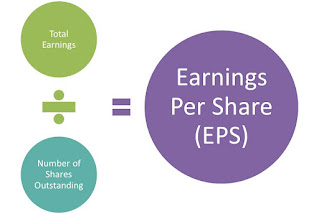Earning per Share (EPS)
Defination
A financial indicator called Earnings Per Share (EPS) shows how much of a company's profit is distributed to each outstanding share of ordinary stock. It is a crucial measure of a business' profitability and is frequently used by analysts, investors, and shareholders to evaluate the financial success of a firm.In valuation measurements like the Price-to-Earnings (P/E) ratio, EPS is crucial. Investors may evaluate how the market values a company's profits by calculating the P/E ratio, which is computed as the market price per share divided by EPS.
Repurchasing shares by companies is one way to increase EPS. A greater EPS is the outcome of dividing the same earnings among fewer shares, which is achieved by having fewer outstanding shares.
Bonus shares are issued without consideration. Hence, these bonus shares donot affect earnings. To calculate Basic Earning per share,we should consider bonus shares since beginning of period reported. It means date of issue of bonus is not relevant.
Investors frequently compare the financial performance of several firms, particularly those in the same industry, using earnings per share (EPS). It facilitates the identification of businesses with robust and stable profits.Businesses usually include EPS in their financial statements on a quarterly and yearly basis, giving investors a better understanding of both short- and long-term performance.
As an economic indicator that reflects larger trends in the state of the economy and market circumstances, changes in EPS across a number of businesses within an industry can be useful.
When assigning credit ratings, credit rating agencies take into account a company's profitability, especially EPS patterns. A favourable credit rating can be attributed to EPS that is strong and stable.
EPS has limitations, including its sensitivity to accounting methods and potential distortions caused by share buybacks or issuance.
Types of EPS:
There are different types of EPS calculations, including:
Basic EPS: Uses the actual number of outstanding common shares.Only the actual number of outstanding common shares is taken into account by basic EPS. The possible dilution that could result from the exercise of stock options, convertible securities, or other instruments is not taken into consideration.
Diluted EPS: Accounts for potential dilution from securities like stock options and convertible securities.Diluted EPS accounts for the potential dilution of EPS by considering the impact of all potentially dilutive securities, such as stock options or convertible bonds. It provides a more conservative measure of a company's earnings per share.
Earnings per share is calculated by dividing the company's net earnings (profits) by the number of outstanding shares of common stock.
[ EPS = Net Earnings / Number of Outstanding Shares ]
Because it facilitates the evaluation of a company's profitability on a per-share basis and makes comparing the financial performance of businesses with various capital structures or numbers of outstanding shares simpler, earnings per share (EPS) is a critical indicator for investors. EPS is a common tool used by investors in their research while choosing investments.
Companies use EPS for various reasons:
Comparison with Peers:
EPS is a key indicator of a company's profitability and is widely used in financial analysis and comparisons, including those with peer companie. EPS makes it simple to assess how well a business is doing in relation to its peers in the same industry. For investors trying to decide what to invest in, this benchmarking is essential.
Stock valuation:
EPS is a valuable metric, it is important to consider it in conjunction with other financial indicators and ratios for a comprehensive analysis of a company's financial health and valuation. Investors should be aware of potential limitations, such as the impact of stock buybacks, changes in the number of outstanding shares, and non-recurring items affecting net income. EPS is a common metric used by investors to assess how appealing a company's stock is. It is a key component of stock valuation models and influences the P/E ratio, or price-to-earnings.
Executive remuneration:
In order to match executives' interests with the company's financial success, several organisations link executive remuneration to EPS performance. Which keeps them highly motivated to increase company earnings which can be beneficial for the overall organisation.
Comparing the earnings per share (EPS) of several businesses in the same sector can offer insightful information about relative performance and investment possibilities. As always, before making any kind of investment, investors should do their homework and take into account a number of other criteria in addition to EPS.
In summary, earnings per share (EPS) is a key performance indicator for investors that shows a company's profitability and possible returns to stockholders. Investors may make wise investment selections by comprehending and evaluating EPS patterns throughout time.




Comments
Post a Comment